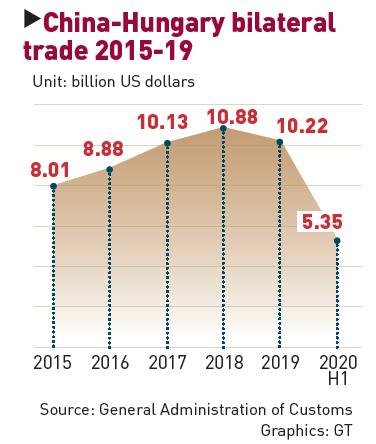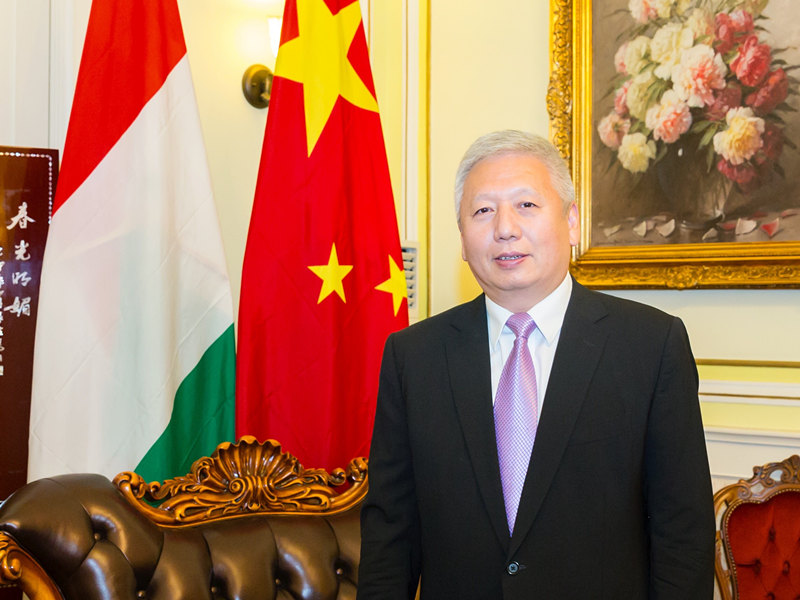China, Hungary overcome difficulties to pursue common development under BRI
By Duan Jielong Source: Global Times Published: 2020/9/14 17:58:03
China, Hungary overcome difficulties to pursue common development

The Széchenyi Chain Bridge in Budapest, Hungary Photo: VCG
The year 2020 is an unusual year. The spread of the COVID-19 pandemic has endangered the health and safety of the people around the world, dealing a blow to the global public health system and creating hurdles to the regular interaction and cooperation between nations.
China, Hungary and the people of the two countries have overcome the current difficulties, worked together to fight the pandemic, and sought common development under the Belt and Road Initiative (BRI), which has opened a new chapter in the friendly exchanges between the two sides.
A friend in need is a friend indeed
The outbreak in China, which occurred during the Chinese New Year holiday, forced factories to shut down. Seven days after Wuhan declared a lockdown on January 23 medical supplies from the Hungarian government arrived in Beijing.
The Hungarian government and people from all walks of life have, in various ways, boosted China's fight against COVID-19, which China will never forget.
When Europe became the epicenter and the Hungary's fight against the pandemic became increasingly severe, the Chinese government and people also felt the pain and returned the favor by extending timely assistance and giving full support.
With the arrival of cargo flights loaded with medical materials in Hungary, sharing of experiences in fighting the pandemic through online meetings, and donations of funds and materials raised by the overseas Chinese for Hungary's fight against the pandemic, the profound friendship between the two countries and two peoples and the comprehensive strategic partnership have been further extended and deepened.
Hungary is the first European country to sign the Memorandum of Understanding with China on jointly promoting the construction of the Silk Road Economic Belt and the 21st Century Maritime Silk Road.
The Hungarian government has always actively supported and participated in the BRI to synergize the country's "Eastern Opening" policy with the BRI, and attached great importance to the "17+1" cooperation mechanism, which has played a leading role in enhancing China and Central and Eastern European Countries (CEEC) cooperation.
Although the pandemic has inevitably brought temporary difficulties to bilateral exchanges, especially economic and trade cooperation and personnel exchanges, the consensus on enhancing friendship between the two countries remains firm and the conviction to deepen cooperation remains unshaken.
Chinese President Xi Jinping and Hungarian Prime Minister Viktor Orban talked over phone on May 15 and agreed to jointly push China-Hungary comprehensive strategic partnership and China-CEEC cooperation to a higher level.
State Councilor and Foreign Minister Wang Yi had a phone call with Foreign Minister Peter Szijjarto on May 14. Both sides supported further deepening of bilateral relations and economic and trade cooperation on mutual trust.
Under the platform mechanism, Hungarian Deputy Prime Minister and Finance Minister Mihaly Varga attended a high-level video conference on international cooperation of the BRI and participated in the initiative on building a healthy Silk Road, promoting economic recovery and practical cooperation.
The "17+1" video conference for information exchange and discussion on the resumption of work and production of SMEs has provided opportunities for Hungarian enterprises. The online service platform for China-CEEC SME cooperation was also officially launched in June amid the COVID-19 outbreak.
Facts speak louder than words
Against the backdrop of a sharp decline in global trade, bilateral trade between China and Hungary reached $5.35 billion in the first half of 2020, up 9.8 percent year-on-year, defying the trend.

China-Hungary bilateral trade 2015-19 Graphics: GT
More importantly, through joint efforts to overcome the adverse impacts of the pandemic, the two sides have successfully signed an agreement for an important pivot project of the Belt and Road, namely the Budapest-Belgrade Railway Hungarian section, which has been approved by the Hungarian parliament and officially entered the implementation stage.Chinese companies such as Huawei, Wanhua and Bank of China are developing steadily in Hungary. The Chinese foreign investment in Hungary is close to $5 billion. All these have provided strong impetus for China and Hungary to deepen bilateral practical cooperation in the post-pandemic era.
It is worth mentioning that Foreign Minister Szijjarto's successful and meaningful visit to China in August marked the very first visit to China by a foreign minister of an EU member state after the outbreak, putting Hungary once again at the forefront of China's relationship with the EU. Szijjarto's visit not only showed the strong resilience of China-Hungarian relations but also reflected the strong desire to speed up the pace of cooperation on both sides.
The BRI was born for cooperation and win-win results. It is believed that under the guidance of the consensus reached by the leaders of the two countries and the concerted efforts of all sectors on the two sides, the BRI will provide inexhaustible impetus for the steady and long-term development of China-Hungary comprehensive strategic partnership, taking it to a new height in the post-pandemic era.
The author is the Chinese Ambassador to Hungary.

Chinese Ambassador to Hungary Duan Jielong Photo: Courtesy of Chinese Embassy in Hungary
Newspaper headline: BRI promotes steady growth